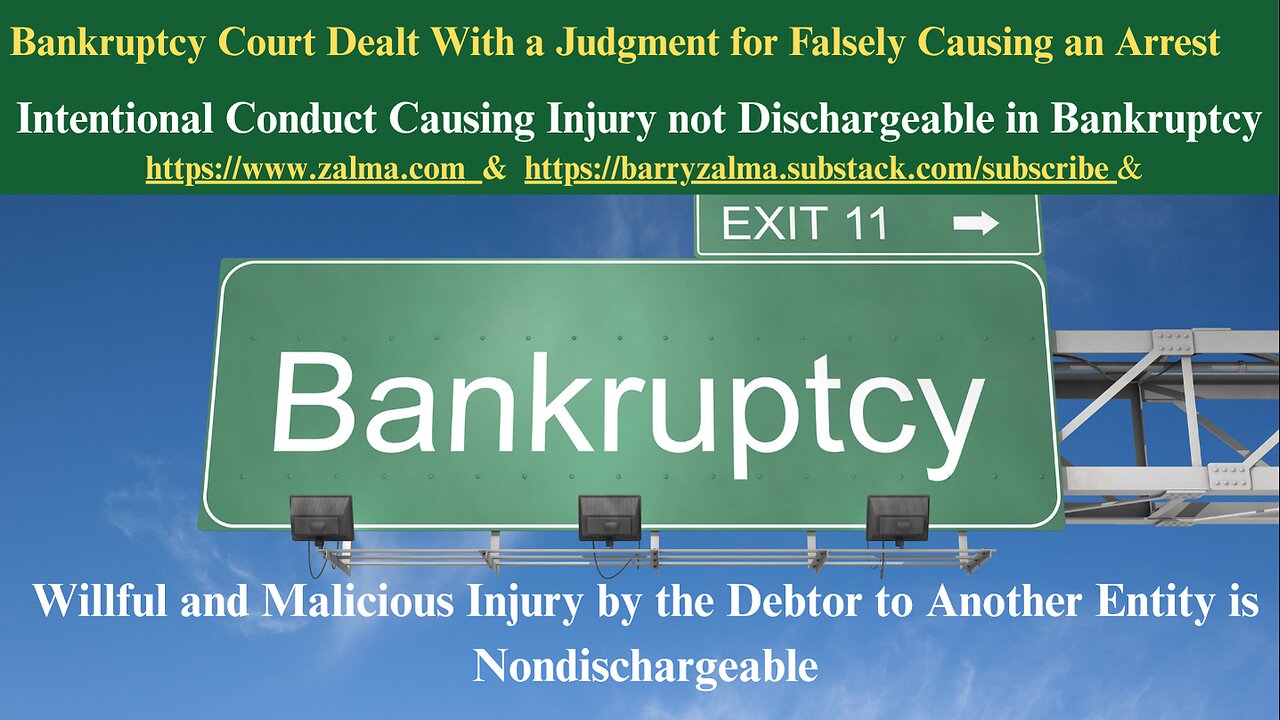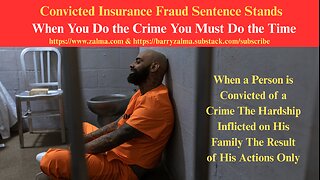Premium Only Content

Bankruptcy Court Dealt With a Judgment for Falsely Causing an Arrest
Intentional Conduct Causing Injury not Dischargeable in Bankruptcy
Post 5202
Willful and Malicious Injury by the Debtor to Another Entity is Nondischargeable
In In re Niko T. Irizarry, Mark Riley v. Niko T. Irizarry, No. 2:24-bk-01261-FMD, Adv. No. 2:24-ap-00035-FMD, United States Bankruptcy Court, M.D. Florida, Fort Myers Division (September 30, 2025) established that fraudulent conduct is not dischargeable in Bankruptcy.
Background and Allegations:
Plaintiff Mark Riley filed a lawsuit against Defendant Niko Irizarry in federal district court, alleging claims for civil conspiracy under 42 U.S.C. § 1983, malicious prosecution, violation of his Fourteenth Amendment rights, common law false imprisonment or arrest, and intentional infliction of emotional distress. Riley's claims are based on allegations with convincing evidence that Irizarry made a false statement that led to the search of Riley's car and his subsequent arrest.
Court Findings:
On February 11, 2022, the Lee County Sheriff’s Office arrested Custodio, Snider, and Irizarry. Irizarry admitted to the Lee County Sheriff’s Office that he lied in a sworn statement to Lieutenant Poklemba of the Lee County Sheriff’s Office, that he had had no prior knowledge that drugs would be found in Riley's car; that he caused Riley harm by arresting him for a crime he did not commit; and that he obstructed the Lee County Sheriffs Office's drug investigation by lying in a sworn statement.
The court found that Irizarry's false statement in his probable cause affidavit was an intentional and deliberate act, substantially certain to lead to the search of Riley's car and his subsequent arrest, and wrongful and without just cause.
Summary Judgment:
Riley's Motion for Summary Judgment was granted, as Irizarry failed to come forward with sufficient evidence to dispute the material facts or the inference created by Riley's evidence. The court concluded that Riley had met his burden of proof, and Irizarry's false statement was both willful and malicious.
Legal Standards:
Under Rule 56(a), summary judgment is appropriate when there is no genuine dispute as to any material fact and the movant is entitled to judgment as a matter of law. An injury is "willful" under § 523(a)(6) if the debtor commits an intentional act with the purpose of causing injury or which is substantially certain to cause injury. An injury is "malicious" if it was wrongful and without just cause or excessive even in the absence of personal hatred, spite, or ill-will.
ANALYSIS
Section 523(a)(6) of the Bankruptcy Code provides an exception to discharge for debts "for willful and malicious injury by the debtor to another entity or to the property of another entity." An an injury is "malicious" under § 523(a)(6) if it was "wrongful and without just cause or excessive even in the absence of personal hatred, spite or ill-will.”
Here, each of Riley's claims is predicated on (among other allegations) allegations that Irizarry falsely stated in his probable cause affidavit that he witnessed Riley with drugs in his hands; that Irizarry's false statement gave rise to probable cause to search Riley's car (in which the planted drugs were found) and for his later arrest; and that as a result of Irizarry's false statement in his probable cause affidavit, Riley was charged with six felonies and faced a maximum of 65 years (and a mandatory minimum of 25 years) in jail.
Based on the record evidence Riley presented, it is undisputed that Irizarry intended his false statement in his probable cause affidavit to injure Riley. At the very least, Irizarry's false statement was substantially certain to lead to the search of Riley's car and Riley's subsequent arrest-i.e., substantially certain to injure Riley. The Court found Riley has come forward with sufficient evidence entitling him to a directed verdict that Irizarry's false statement was willful.
Once Riley met his burden of coming forward with evidence entitling him to a directed verdict, the burden shifted to Irizarry. Irizarry failed to meet his burden of coming forward with sufficient evidence to call into question the inference created by Riley's evidence.
Based on the record evidence, there is no dispute as to any material fact that Irizarry's false statement in his probable cause affidavit was (a) an intentional and deliberate act; (b) that, at a minimum, was substantially certain to lead to the search of Riley's car and his subsequent arrest; and (c) wrongful and without just cause.
Plaintiff Mark Riley's Motion for Summary Judgment was GRANTED.
The Court entered a separate final judgment determining that Plaintiff Mark Riley's claims against Defendant Niko Irizarry in the District Court Action are nondischargeable under 11 U.S.C. § 523(a)(6).
ZALMA OPINION
Irizarry's attempt to avoid a judgment brought by Mark Riley for his false arrest and malicious prosecution failed. Bankruptcy is a system to help people avoid debts they incurred and start their life anew. It is not available to protect a person from his intentional and wilful act to get Riley arrested and jailed. There is no right to discharge the judgment because of the wrongful conduct of Irizarry.
(c) 2025 Barry Zalma & ClaimSchool, Inc.
Please tell your friends and colleagues about this blog and the videos and let them subscribe to the blog and the videos.
Subscribe to my substack at https://barryzalma.substack.com/subscribe
Go to X @bzalma; Go to Barry Zalma videos at Rumble.com at https://rumble.com/account/content?type=all; Go to Barry Zalma on YouTube- https://www.youtube.com/channel/UCysiZklEtxZsSF9DfC0Expg; Go to the InsuranceClaims Library – https://lnkd.in/gwEYk.
-
 7:11
7:11
Insurance Law
12 days agoConvicted Insurance Fraud Sentence Stands
291 -
 LIVE
LIVE
Camhigby
53 minutes agoLIVE - Riot Watch Portland, DC, NC
216 watching -
 LIVE
LIVE
CAMELOT331
3 hours agoYouTube Just Told Me I OWE THOUSANDS $ TO THEM... update
239 watching -
 LIVE
LIVE
Tundra Tactical
10 hours ago🛑LIVE AT 9PM CST!! Your Government Hates Your Guns : DOJ Holds Firm On National FIREARMS ACT
179 watching -
 UPCOMING
UPCOMING
DLDAfterDark
1 hour agoAre YOU The Guy That Ruins Thanksgiving?? - God Guns & Gear
27 -
 LIVE
LIVE
NewsTreason
2 hours agoDECLAS w/ Rambo & Dave: Nuremberg 2.0 | MTG Exits Stage Left | Mamdani Psyop Confirmed, 8pm EST
7,663 watching -
 LIVE
LIVE
meleegames
2 hours agoSONG REQUESTS CLOSED - Melee Music - Beat Hazard 3 - Devil Inside
132 watching -
 LIVE
LIVE
The Connect: With Johnny Mitchell
9 hours agoIs Garth Brooks A Serial Killer? Exposing The Dark Secrets Of Country Music's Biggest Star
192 watching -
 1:00:49
1:00:49
MattMorseTV
3 hours ago $53.63 earned🔴Massive VICTORY in the SUPREME COURT.🔴
91.8K70 -
 LIVE
LIVE
GritsGG
1 hour ago#1 Most Warzone Wins 4015+!
82 watching